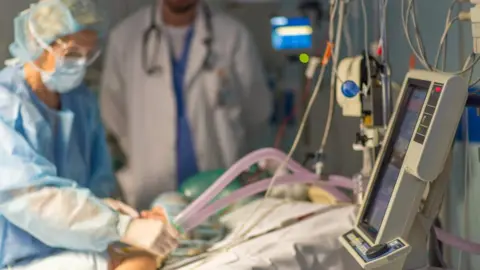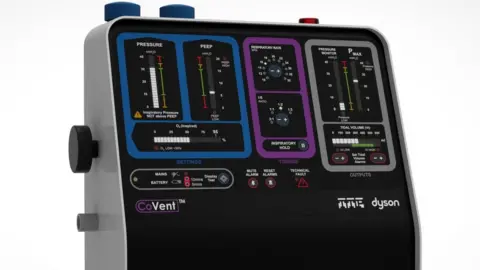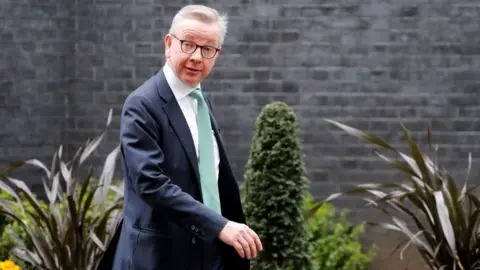Manufacturers cast doubt on ventilator target
 Getty Images
Getty ImagesThe UK may not have all the ventilators it needs by the time coronavirus cases in the country reach their peak, engineering firms warned.
Health officials expect the UK to experience its highest number of infections in around two weeks' time.
The UK has just over 8,000 ventilators, significantly fewer than the 30,000 the government estimates are needed to cope with the fallout from the peak.
Manufacturers told the BBC they cannot produce enough to meet that deadline.
However, one firm involved in the plans to produce the life-saving machines, said that by early May the country would be "in a much better position".
There is widespread uncertainty within government and industry about how many ventilators it is possible to produce, which firms can make them and by when.
Dyson has received an order for 10,000 units, pending regulatory approval. The firm, headed by British inventor Sir James Dyson, has drawn up its design from scratch in collaboration with Cambridge-based medical firm The Technology Partnership.
 Dyson
DysonDyson has said it is hopeful its design would be approved within days, which would allow it to begin production within two weeks. However, there has since been doubt cast on whether that timescale for approval was realistic.
Another consortium including engineering firms Airbus, GKN, Rolls Royce, Megitt and others are working on ramping up production of a simplified design based on existing technology from medical ventilator specialist firms Penlon and Smiths.
As well as asking the consortium for help in sourcing parts, it is thought two new manufacturing facilities will be opened - one in the North and one in the South West.
However, with so many different firms involved in the consortium, there is also uncertainty about how quickly approval for the design and accelerated production can happen.
'Not racing'
Separately, the members of the consortium plan to ramp up supplies to firms Penlon and Smiths which already make ventilators.
One company told the BBC: "We are not racing each other, we are racing against the virus."
The urgency of the situation appears to have exposed cracks in collaboration between government departments. The BBC understands that in one instance the Department of Health was unaware that 10,000 ventilators had been ordered from Dyson, despite the order having been placed in a Cabinet Office-headed letter.
There has also been confusion about why the UK did not participate in an EU-wide procurement order for tens of thousands of new ventilators.
Some Whitehall sources say the invitation to participate languished in the in-tray of more junior Health Department officials until it was too late. Meanwhile, government sources claimed that the programme would not have made a meaningful difference to available equipment because the UK would have been one of 28 countries vying for the new units.
Cabinet Office minister Michael Gove said the UK was capable of producing all the units it needed itself. But manufacturers have said the country may not to be able to do so in the timeframe required to face the peak of UK infections.
 Getty Images
Getty ImagesOne thing is clear: there is no such thing as ordering too many, from wherever made by whomever.
The UK has the same target of 30,000 as the state of New York which has a third of the population of the UK.
Consortium members said there was also demand from countries including Kenya and South Africa. So in the unlikely event the government finds itself with a UK surplus, there will be no shortage of overseas buyers.
The BBC has approached the government for comment.